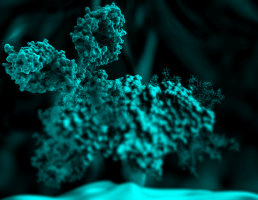
The Committee for Medicinal Products for Human Use (CHMP) of the European Medicines Agency (EMA) has adopted a positive opinion recommending approval of pembrolizumab, Merck’s anti-PD-1 therapy, in combination with pemetrexed and platinum chemotherapy (cisplatin or carboplatin) for the first-line treatment of metastatic nonsquamous non-small cell lung cancer (NSCLC) in adults whose tumors have no EGFR or ALK genomic tumor aberrations, regardless of PD-L1 expression.
If approved, this would mark the first approval in Europe for an anti-PD-1 therapy in combination with chemotherapy, and is based on overall survival (OS) and progression-free survival (PFS) data from the Phase 3 KEYNOTE-189 trial.
The CHMP also adopted a positive opinion recommending approval of pembrolizumab as monotherapy for the treatment of recurrent or metastatic head and neck squamous cell carcinoma (HNSCC) in adults whose tumors express PD-L1 with a tumor proportion score (TPS) of ≥50 percent, and who progressed on or after exposure to platinum-based chemotherapy, based on data from the Phase 3 KEYNOTE-040 trial.
These two recommendations will now be reviewed by the European Commission for marketing authorization in the European Union (EU).
A final decision on both recommendations is expected in the third quarter of 2018.
“There is significant need for innovative therapies that can improve the overall survival of patients suffering from metastatic non-small cell lung cancer, as lung cancer is the leading cause of cancer deaths in Europe,” said Dr. Roger M. Perlmutter, president, Merck Research Laboratories. “The KEYNOTE-189 trial demonstrated a significant survival benefit for the combination of KEYTRUDA with chemotherapy as compared with standard-of-care chemotherapy alone. We look forward to working with European regulatory authorities to bring this important treatment regimen to patients in Europe as quickly as possible.”
Source: BusinessWire
The World Cancer Declaration recognises that to make major reductions in premature deaths, innovative education and training opportunities for healthcare workers in all disciplines of cancer control need to improve significantly.
ecancer plays a critical part in improving access to education for medical professionals.
Every day we help doctors, nurses, patients and their advocates to further their knowledge and improve the quality of care. Please make a donation to support our ongoing work.
Thank you for your support.